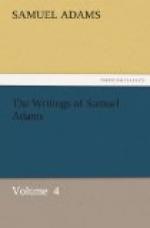of what our People called English Liberties, by the
same Means. We shall never subdue them, said Bernard,
but by eradicating their Manners & the Principles
of their Education. Will the judicious Citizens
of Boston be now caught in the Snare, which their
artful, insidious Enemies, a few years ago laid for
them in vain? Shall we ruin ourselves by the
very means, which they pointed out in their Confidential
Letters, tho even they did not dare openly to avow
them? Pownal, who was indeed a mere Fribble,
venturd to have his Riots & Routs at his own house,
to please a few Boys & Girls. Sober People were
disgusted at it, & his privy Councellors never thought
it prudent to venture so far as expensive Balls.
Our Bradfords, Winslows & Winthrops would have revolted
at the Idea of opening Scenes of Dissipation & Folly;
knowing them to be inconsistent with their great Design,
in transplanting themselves into what they called
this “Outside of the World.” But
I fear I shall say too much. I love the People
of Boston. I once thought, that City would be
the Christian Sparta. But Alas! Will men
never be free! They will be free no longer than
while they remain virtuous. Sidney tells us,
there are times when People are not worth saving.
Meaning, when they have lost their Virtue. I pray
God, this may never be truly said of my beloved Town.
Adieu. My Respects to Mrs Scollay & Family &
believe me to be sincerely
Your Friend
If Mr B A 1 thinks a Question from me worth his answering,
ask him whether he has lost some value-able Books
which I have seen in his Library, the Works of our
illustrious Forefathers.
1 Benjamin Austin.
1781
TO RICHARD HENRY LEE.
[Ms., Lee Papers, American Philosophical Society.]
Philade Jany 15th 1781
MY DEAR SIR
Your second Letter came to hand in due Season.
My much Esteemed Friend Mr Arthur Lee will take the
Charge of this. I will say to you as I have said
to my Boston Friends, who are sollicitous to know what
Treatment he meets with here. The more I have
conversd with him, the more I have been confirmd in
a good opinion of him, and lamented the Mistakes and
Prejudices of some Men & the Wickedness of others.
His Enemies, I think, dare not openly attack his Reputation
or Conduct. But the Whispers of Envy & Malice,
have sometimes Influence enough to prevent the Justice
due to the virtuous Citizen. When this is the
Case, it affords a Symptom of the Decay of publick
Spirit, more threatning to the Liberties of a Common
Wealth than Hosts of foreign Enemies. Monarchs
have their Favorites who serve as Pimps on their honest
Subjects. But Republicks should examine the Conduct
of their Servants with an impartial Eye; and it discovers
the Want of pub-lick Virtue, as much, to withhold
their Smiles from the wise and good as to bestow them




